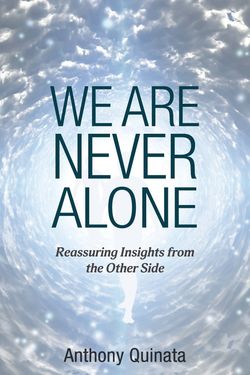Читать книгу We Are Never Alone - Anthony Quinata - Страница 13
CHAPTER 3 Don’t Call Me a Psychic
ОглавлениеAt the time that all of this happened at Mary’s house, if you would have asked me whether or not I was a psychic, I would have said, “No.” I didn’t consider myself to be a “psychic,” highly intuitive, yes, but definitely not a psychic.
Now I know I was halfway correct. A psychic is someone with a highly developed sense of intuition and who can feel, intuitively, circumstances or information about the person he’s “reading,” or their loved ones, depending on the type of intuition the psychic has developed. That intuition may even let the psychic know circumstances of loss or future events around the person he’s reading.
True mediumship, however, is something different altogether. For a medium, two elements have to be in place—a soul in the hereafter who wants to communicate and someone here who is willing to receive the messages. In other words, while psychics rely on their intuition to supply what they are passing along to their clients, mediums rely on communication from souls that have made the journey from this life to the next for the information they pass on. For short periods of time a medium can act as a bridge between this life and the next, linking the souls in the hereafter with their loved ones here and providing a human voice to the souls so that their messages can be communicated to those who otherwise couldn’t hear or feel them.
I consider myself to be a medium. When I’m doing a session for a loved one(s), unless the information comes from the souls in the hereafter, I won’t know it, and I don’t have anything to say unless the messages come from the souls themselves.
When it comes to passing these communications along, I’m not perfect and I have never claimed to be. When it comes to understanding what I’m hearing, as anyone who knows me will tell you, I often get it wrong with those who are still living. Messages from the souls can, and do, get misinterpreted by me.
People think that I, as a medium, “talk to dead people.” Actually, the exact opposite is true. They communicate with me. I listen and convey what I’m receiving to the members of their families who are still here. Whenever I’m doing a session, whether it’s one-on-one, either in person or over the phone, a small number of people related to one another, or a small group of up to twenty-five, most of whom are strangers to one another, I always tell people to keep their answers to the evidence I’m giving to either “yes” or “no.” I want only the absolute minimum information to let me know if I’m interpreting the evidence I’m receiving correctly or not. I say to people, “Most of what I’m telling you won’t make sense to me, and it’s not supposed to. This is not about me. It’s about you. As long as the evidence I’m giving you makes sense to you, that’s all I care about.”
The messages in each session I do are like pieces of a puzzle that eventually come together into a solid picture. While no two sessions are the same, there is a distinct pattern that they follow starting out with general information, becoming more specific, and usually ending with a fact, name, or event that is known only to the soul and its loved one.
So what’s the point? They want us to know that death is not a wall that separates us from them but a door between this life and the next and that their lives and the world they live in there are real.
